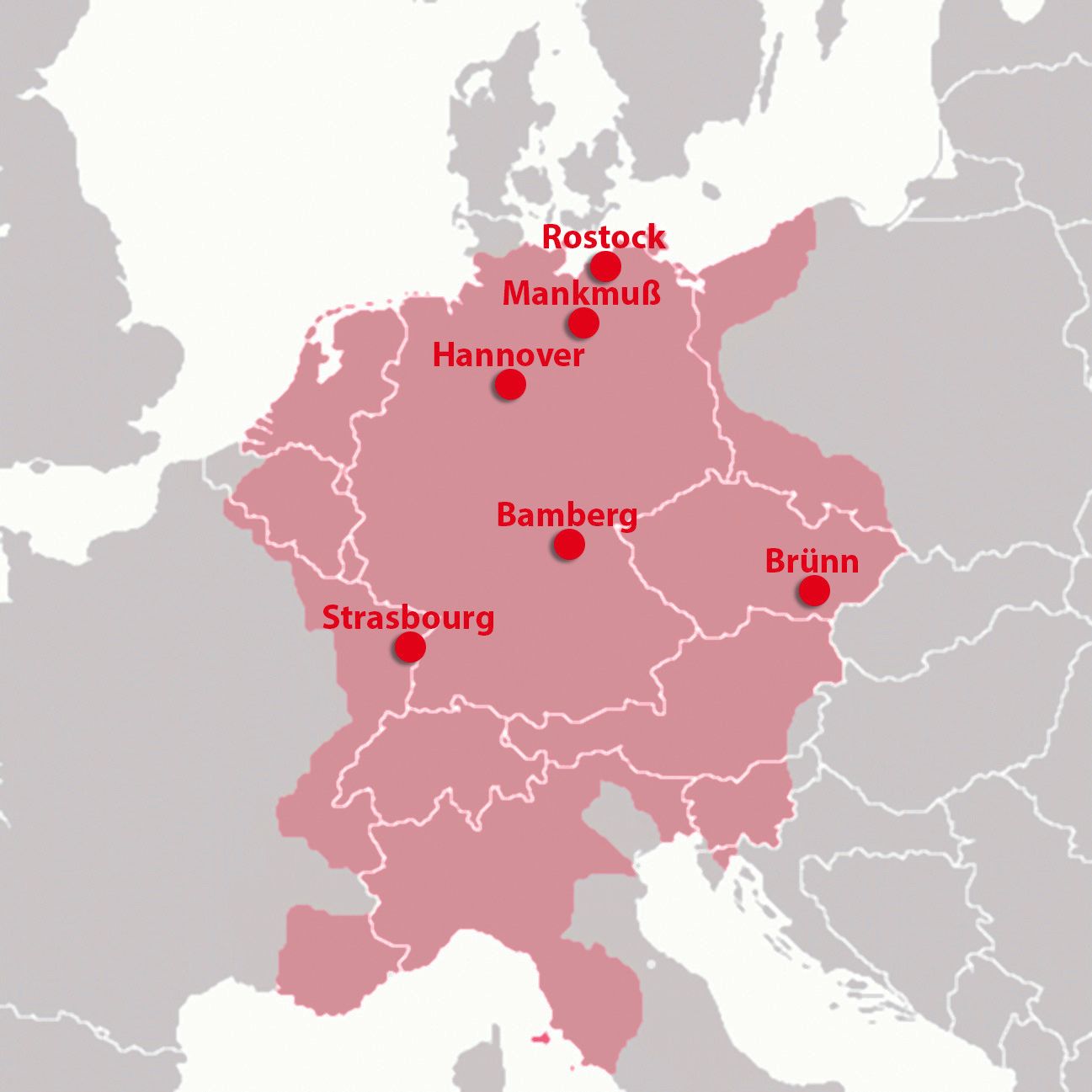The name "Lorber" is probably derived from the Middle High German word for the spice plant laurel. It is considered very likely that the first name bearer was a spice dealer. It also fits that the first mention was related to ownership in the Krämergasse in Rostock.
The name
Possible roots of the family
Relevant name lexicons mention several early mentions of the name:
- Hans Bahlow: Deutsches Namenlexion: Godeke oder Godike Lorbere (Rostock 1293), Hermann Lorbere (Hannover 1312), Otto Lorberer (Brünn 1345)
- Freiherr zu Hammerstein: Die Besitzungen der Grafen von Schwerin: Conradus Lorber (Mankemus 1294), Johannes Lorbere und Hubertus Lorberen (Kloster Wienhausen 13. Jh.)
- Alphonse Lorber: Chronik des Dorfes Ebersheim: Ulricus Lorber (Straßburg 1316)
- Duden, Lexikon der Familiennamen: H. Lorber (Nürnberg 1363)
It is striking that the first mentions are geographically far apart. On the one hand, this could indicate that several families chose this name independently of one another. On the other hand, Hans Bahlow points out in his "German Name Encyclopedia" an activity as a spice dealer, which could explain an early spread of a related family. This suggests that Strasbourg was already a hub of trade in spices (including laurel) from the Mediterranean region with the Holy Roman Empire in the Middle Ages. An indication of the merchant stand may also be that the early Lorbers are mostly mentioned as advisable citizens or appear in other rather upscale positions: in Rostock in 1293 as landowners in Krämerstrasse [1], in 1294 as tenants of the Counts of Schwerin [2], 1316 in Strasbourg as a priest, from about 1400 councilors in Bamberg (also proven as a copper dealer there), 1432 citizens in Hameln [4], 1439 mayors in Landshut [5], 1507 councilors in Stralsund [6], 1514 mayors in Rastenberg.
These considerations lead to two possible theories:
1. Origin in Northern Germany / Danish gender:
In fact, the earliest surviving documents from the end of the 13th century can be found in the county of Schwerin and the neighboring areas of Rostock and the Duchy of Braunschweig-Lüneburg. The first name “Godike” in the earliest mention speaks for this origin, which is hardly proven outside this region. Christoph Lorbeer's entry in the Allgemeine Deutsche Biographie speaks of an origin from a Danish knightly family. In fact, Rostock and the county of Schwerin were temporarily under Danish rule between 1202/1203 and 1225 since the end of the 12th century. Perhaps the ancestors of the Lorbers came south as champions of the Danish king. Later they seem to have started working as a spice trader, which would also explain the naming. In this context, it is conceivable that a part of the family was sent to the then flourishing trading city of Strasbourg to support the trade in the spice, which was probably imported from southern Europe. This would explain the mention of the name in the Alsatian metropolis that has been documented since the early 14th century.
2. Separate families in the north and in Alsace:
In view of the large geographical distance between the early mentions, it cannot be ruled out that the names are coincidental. Possibly from at least two independent spice dealer families.
Sources:
- [1] MecklUB III, No. 2,331, p. 582: Detmarus corrigicida et Godiko Lorbere vendiderunt magistro Johanni apothecario ligna et edificia, que habebant in strata institorum. (Memento of the original from December 3, 2013 in the Internet Archive) i Info: The archive link has been inserted automatically and has not yet been checked. Please check the original and archive link according to the instructions and then remove this notice.
- [2] Wilhelm von Hammerstein-Loxten: The possessions of the Counts of Schwerin on the left bank of the Elbe, 1860, p. 146
- [3] Hans Paschke: Uff der Greten zu Bamberg, Bamberg, 1962, pp. 50ff
- [4] History of Lower Saxony, Volume X. Document Book of the Abbey and the City of Hameln. Second part 1408-1576. Hahn bookstore, Hanover and Leipzig, 1903.
- [5] Otto Titan von Hefner, Memorable and Useful Bavarian Antiquarian, Volume 2, Munich, 1867




